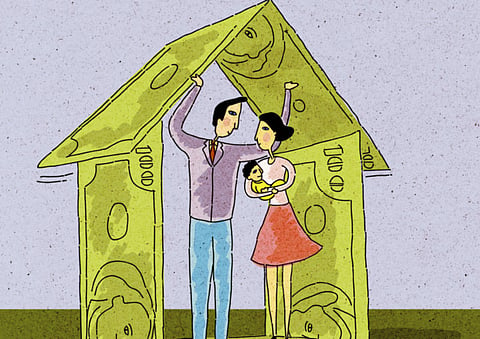Making the mortgage cap fit
New limits on loan-to-value ratios will ensure that buyers don’t borrow more than they can afford to repay, preventing the market from boiling over

The Central Bank of the UAE implemented caps on loan-to-value (LTV) ratios for residential mortgages in the last quarter of 2013 to help prevent the overheating of the property market, to regulate financing, and to increase transparency. The bank set borrowing limits for first home loans at 75 per cent of a property’s value for expatriates and 80 per cent for UAE nationals for properties worth less than Dh5 million. For properties worth more than this, the loan cap for expats was set at 65 per cent of the purchase value and 70 per cent for UAE nationals. For subsequent properties, the cap was set at 60 per cent for expats and 65 per cent for nationals, regardless of the property’s value.
While the new regulations are expected to stabilise the market in the UAE, the change could hurt a chunk of potential buyers. It will now force many first-time, middle-income buyers dependent on mortgage finance to find a sizeable deposit, which could delay their purchase. “With some households now effectively priced out of the market, they will have no choice but to continue renting for longer, which is likely to have a knock-on impact on the pace of rental value growth across the city,” says Jonathan Fothergill, Director of UAE Valuations at Cluttons, a property management and consultancy services company.
However, he adds that these regulations will certainly help Dubai’s real estate market to mature in a way that will allow for sustainable long-term growth, avoiding the debt-linked challenges seen during the last property cycle.
The rule also stipulates that monthly repayments cannot exceed 50 per cent of borrowers’ monthly incomes, and the total loan amount should not surpass seven years’ annual income for expats and eight years’ annual income for UAE nationals, preventing financial institutions from lending more than borrowers can afford to repay.
Despite the new cap, market watchers are confident that demand for mortgages will remain robust in the long term.
“Over time, homebuyers will factor the cap into their budgets. Rents are rising and monthly mortgage repayments over a 25-year term are 20 per cent cheaper than renting. Even if potential homebuyers need to make a slightly larger down payment now, buying a home makes better financial sense in the long term,” says Sam Wani, General Manager, Independent Finance, a Dubai-based mortgage consulting firm.
Bankers generally agree that the implementation of the cap is another affirmative step towards regulating the UAE’s real estate and mortgage sectors.
“While it is too premature to comment on the precise impact of the cap on the home finance sector, we believe that the revised LTV regulation is in line with international markets,” says Pawan Dhawan, Manager, Mortgages, Mashreq Bank. He says that the regulation is a welcome move aimed at increasing the owner’s equity or self-contribution in the investment, which will bring in much needed stability and balance over the long run.
“In the short run, however, we expect transaction volumes for mortgages to dip slightly in the first quarter until end users and investors adjust to the revised LTV ratios,” he adds.
Raman Muralidharan, Regional Head of Customer Value Management, Retail Banking and Wealth Management, HSBC, says, “The mortgage market has really improved. Now, there are many lenders offering competitive products. In the last year, we have seen a reduction in pricing, an increase in LTVs, the waiving of fees and other freebies thrown in.” But he adds a note of caution. “Underwriting at banks is still conservative, so we will not see any aggressive lending that we witnessed in 2007 to 2008.”



